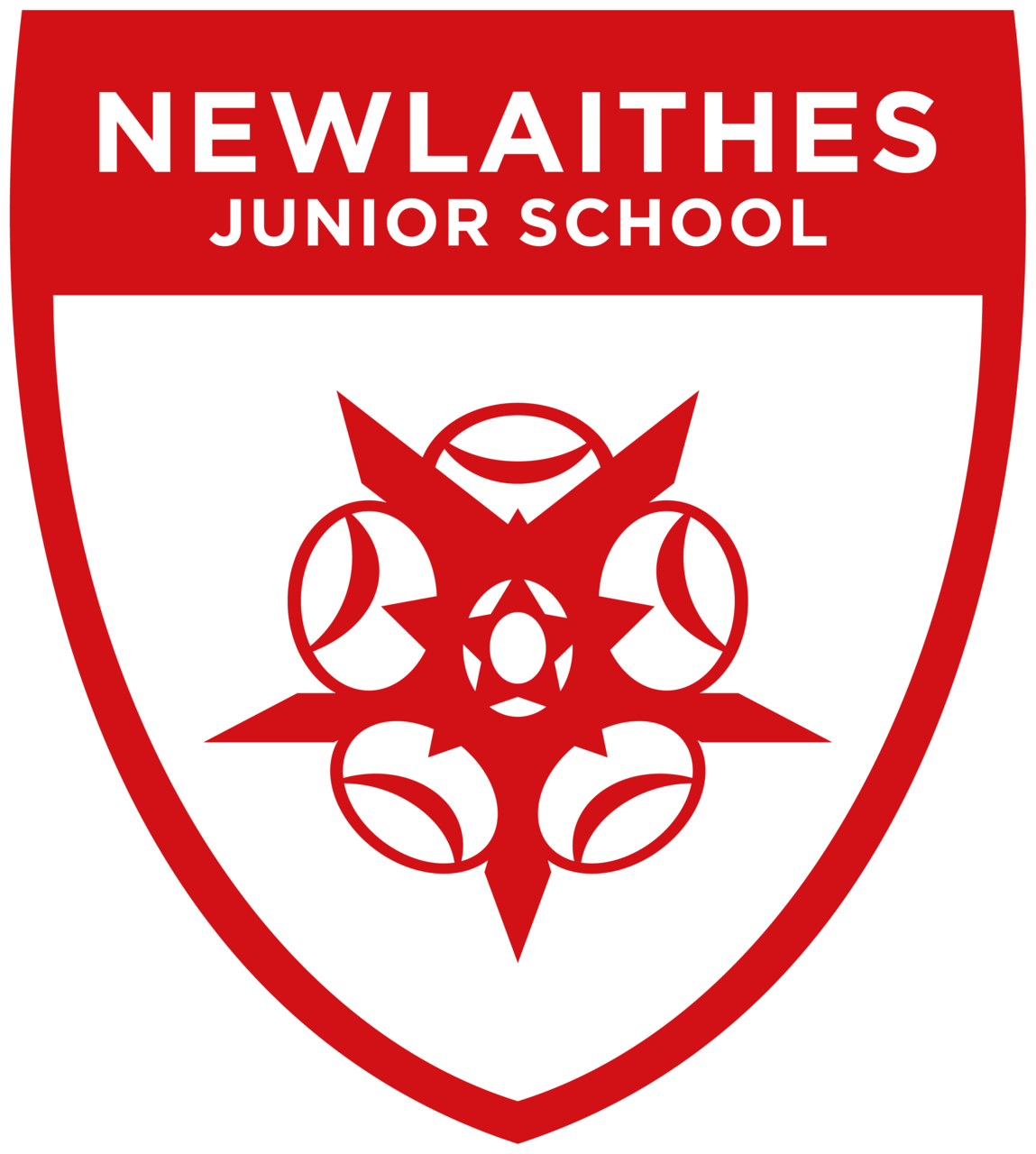Reading and Phonics
Intent
At Newlaithes Junior School we strongly believe that learning to read is the foundation for all educational success and our aim is to teach every child to read, regardless of their socio-economic circumstances, their ethnicity, the language spoken at home and most special educational needs or disabilities. We want our children to not only have the opportunity to learn to read but to become lifelong readers for purpose and pleasure. They will become people who not only can read, but do read from choice a wide variety of texts on paper and on screen across the whole curriculum. By the time children reach the end of Year 6 we want them to read fluently and with confidence across all genres. By giving our children the gift of reading, we show them that books, especially literature and poetry, have the power to inspire, to console, to heal and transform for the rest of their lives.
We recognise that phonics is fundamental to children being able to access a broad range of fiction and non-fiction texts across the whole curriculum. With this in mind we are only too aware of the importance of phonics in the teaching of reading and focus on developing pupils’ competence in both word reading and comprehension. Skilled word reading involves both the speedy working out of the pronunciation of unfamiliar printed words (decoding) and the speedy recognition of familiar printed words. Underpinning both is the understanding that letters on the page represent the sounds in spoken words.
Implementation
At Newlaithes Junior School reading is carefully planned to achieve the objectives in the national curriculum and teach the children the skills they need to be successful readers, focusing on the following reading domains:
- Give and explain the meaning of words in context;
- Retrieve and record information, identifying key details from fiction and non-fiction texts;
- Summarise the main points/ideas from more than one text;
- Make inferences from the text, explaining and justifying their inferences with evidence from the text;
- Predict what might happen from details that are stated or implied;
- Identify and explain how meaning is enhanced through the choice of words and phrases;
- Make comparisons within the text.
We embrace the acquisition of reading skills, the growth of literacy awareness and responsiveness and the development of the ability to use reading in all aspects of learning and study. We strive to ensure that the school environment is a rich and stimulating learning resource with the use of captions and labels on walls and on artefacts in order to provide a variety of reading opportunities for response or for information.
Teachers model reading strategies during shared reading sessions, whilst children have the opportunity to develop reading strategies and to further discuss texts in greater detail during guided reading sessions, helping them to become fluent and independent readers. A variety of books from different genres are used for guided reading as well as books taken from the ‘White Wolves’ Guided Reading series. These are differentiated to suit the ability of each reading group. Independent reading provides time for both assessment and 1-1 teaching. Discrete phonics lessons take place throughout the Key Stage for those children whom it is deemed necessary in order to enable these children to decode more efficiently. (Little Wandle further supports the teaching of Phonics.)
Selections of reading schemes are used to support children in Year 3 and where appropriate children in Year 4.
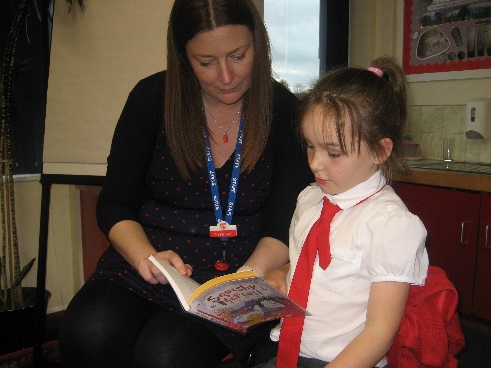
(These include: Oxford Reading Tree, Rising Stars, Dandelion Launchers and Dandelion Readers are also used and these go hand-in-hand with the phonics scheme.) Books in the library are also banded allowing the children to select books relevant to their reading ability. Teaching assistants, wherever possible, support reading activities to ensure that children have more frequent opportunities to read with adults. From the beginning of Year 3 right up to Year 6, children should be encouraged to treat reading as a desirable experience. Quality books and other reading material should be available for them to look at, browse through and enjoy. The provision of a wide and varied stock of fiction and non-fiction books is essential.
Although many children when they arrive at Newlaithes Junior School have mastered their knowledge of phonics some still need structured teaching. Teachers and teaching assistants involved in teaching phonics have received training in the systematic teaching of synthetic phonics. We work closely with our feeder school in order to support a seamless transition in terms of the children’s phonics learning.
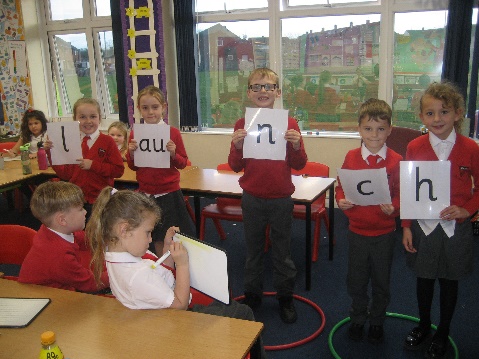
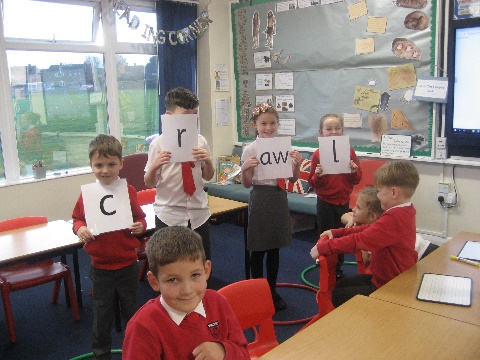
Choosing which sound to use in our spellings.
Ongoing teacher assessment, both informally and formally, helps monitor each child’s progress and attainment. Each term all children take standardised reading tests that support the moderation and validation of our teacher assessments. Data is then recorded on our online tracking system. Both types of assessments help identify any intervention that might be necessary to help support the child’s progress and attainment.
Reading for Pleasure is strongly encouraged and many exciting and rewarding activities are arranged in school to promote the pleasure and knowledge that can be gained from books, i.e. ‘Book Week’. Visits by published authors, skilled story tellers from many cultures, performances by professional theatre groups, making books, using drama, dance and music to illustrate texts are just some of the opportunities the children are given.
Children across the Key Stage take home a reading book from a reading scheme/the school library. Those children still learning to read have access to books to help these children to continue to grow in confidence as readers with a text that is appropriate for their age group. Each child has a home school reading record that teachers and parents can use to share information about a child’s reading. Parents are encouraged to read with their children (see Homework Policy). Information is given on how to support their child at meetings and also in curriculum letters. We constantly strive to encourage all readers to share a book at home with their grown-ups. We believe that this not only helps to develop inferential skills, but also supports a lifelong love of reading. Throughout the Key Stage children become more independent in recording information about what they have read in their reading journals. We recognise the value of adults (both in school and at home) reading aloud to children, in order to improve their grasp of story language, enthuse them with a love of books and inspire them as writers.
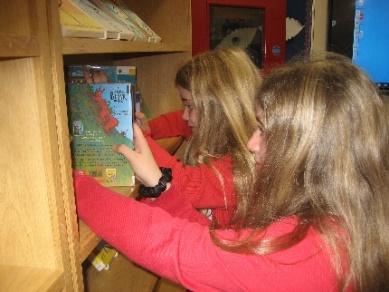
The ‘School Book Fair’ is also felt to be a valuable tool. It is seen as an opportunity for the parents and children to choose books together and to increase the range, number and quality of books in the children’s homes. (Proceeds from the Book Fair- which is run by the PTFA - have been used to further increase the books available in the school library.)
To achieve this aim of creating a community of lifelong readers, we will use the following strategies:
- All staff will act as role models for active, engaged reading by sharing their pleasure and enjoyment of texts of all kinds in the planned curriculum and informally. Sharing and talking about books and other reading materials will be frequent and regular, inside the classroom and outside, during lessons and at other times. Adults will make explicit how reading has an essential role in their lives.
- All pupils will have access to a wide range of fiction, poetry and non-fiction in different formats, and support in enjoying them, where necessary. We will widen our knowledge of what is available to interest all our children, to include picture books and graphics texts for all ages and the use of technology, such as e-readers. Non-fiction will include material such as magazines, catalogues, comics, leaflets, newspapers, as well as traditional non-fiction texts. Developing comprehension through the use of audio-books, both whole and shortened, will play an important part in increasing enjoyment and access to texts for all.
- Reading will be at the heart of the curriculum with links to planning for reading for pleasure for all pupils across all subjects and classes. Every topic, theme or subject area will include specific linked texts, poems and appropriate websites.
- We will harness the power of reading aloud as the key driver in increasing reading for pleasure and developing pupils’ positive attitudes towards this key skill. Staff will choose from a selection of high-quality texts for each year group, supplemented by texts of their choice, and make reading aloud sessions an integral part of each day. Listening to adults read aloud is enormously beneficial as it allows pupils to soak up the tunes and rhythms of the language. Being removed from the need to translate the marks on the page gives freedom for the mind and imagination to move at leisure. Older pupils need this experience just as much as younger ones. Pupils can access texts of greater difficulty and depth than their current independent reading skills allow, mediated through the expressive reading of a skilled adult, creating meaning through the text and the voice.
- We will provide time for shared, guided and independent reading across the curriculum. Shared reading, where everyone has access to the text through Big Books, individual copies or through a visualiser, teaches reading at a challenging level with adult support. Guided reading allows children to read at a level at the edge of their independent skill alongside children of similar reading ability, with adult support. Independent reading is wide-ranging and becoming an independent reader with preferences and the willingness to ‘have a go’ takes dedicated time and needs to be developed from an early age.
- We will encourage and help parents/carers to support their children’s reading through a range of strategies suitable for each age group. We will stress that teaching reading does not stop once children have gained decoding skills and that reading aloud to children is as important as listening to them read. We will involve them in as many ways as possible in supporting reading at school and at home.
- We will audit our reading resources regularly, involving the pupils in the process of choosing books and other reading materials for class and library stock. We will keep book areas and displays up-to-date, tidy and attractive, again involving the children in maintaining a high standard. The message that our school is a vibrant reading community will be clearly visible.
- We will make sure that our school library is a central learning resource, well-used and well-maintained by staff and pupils. We will make the library welcoming, accessible for all ages and comfortable. We will audit the stock regularly to make sure it is relevant, up-to-date and attractive (working hand-in-hand with the School Library Service). Children in Year 6 will also carry out the role of librarians and have the opportunity to work alongside the library service. (We are fortunate to have a well-stocked school library which is an attractive environment for the children to select books, read and carry out small group learning activities. As well as housing our coded books, we also have an extensive non-fiction section, which alongside books borrowed from the School Library Service, supports the teaching and learning of our foundation subjects.)
- Visits from the mobile library service will take place termly helping to further enrich children’s love of reading.
- We will develop our links with the library service and encourage families to become members of their public library as well as encouraging children to become owners of books at home.
- We will provide training and professional development for all staff so that we develop an embedded, sustainable culture of reading.
Impact
We believe that reading is the key to all learning and it must be remembered that the impact of our reading curriculum goes beyond the statutory assessments. Throughout the key stage, children develop their fluency and comprehension whilst having the opportunity to access a range of texts both with support and independently. Our teacher assessments and termly standardised tests allow us to measure individual progress and attainment and help us identify and implement additional support for those who may need it. Our desire is that when the children move onto the next chapter of their education, they possess the reading skills and love of literature which will allow them to both enjoy and access any aspects of learning they may encounter in the future.
The above should be read in conjunction with the following school policies:
- English Policy
- Reading for Pleasure Policy
- Letters and Sounds Policy
- Reading Progression Maps
